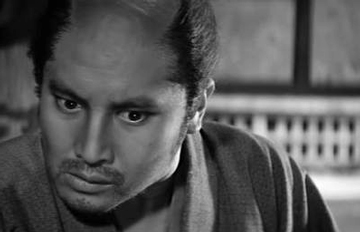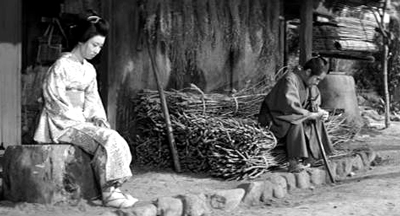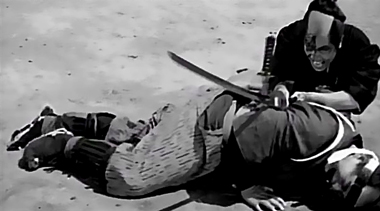
 |
|
|
|
Not a well-known name in the United States, Japanese director Tadashi Imai earned the respect of his peers and more than his share of industry honors. He made social dramas criticizing the harsh economic conditions imposed on fishermen and rice farmers, and his keen eye for malicious social structures informs genres traditionally free of editorial comment. For instance, a Tadashi Imai romance examines the injustice inherent in traditional arranged marriages. Imai's 1959 I Want to Be a Shellfish tells the story of a citizen soldier railroaded in a war crimes trial. Condemned for following his superiors' orders, the soldier hopes that when he's reincarnated in the next life, he not come back as a human being. 1964's Revenge (Adauchi) immediately distinguishes itself from the dozens of samurai costume films being turned out by the Toei studio. The story is told with economy and precision by screenwriter Shinobi Hashimoto, who contributed to the screenplays for many of Akira Kurosawa's best-known classics: Rashomon, Ikiru, Seven Samurai, The Hidden Fortress. We see the elaborate preparations for a court-sanctioned sword duel to settle a grudge between two clans. A bamboo fence is erected following strict regulations, and formal seating areas are reserved for the presiding officials. But the pomp and circumstance is an effort to legitimatize a sordid and shameful tragedy of "samurai honor". 
Poor samurai Ezaki Shinpachi (star Kin'nosuke Nakamura) dares to respond to an insult by the eldest brother of the wealthy Okumo clan. Shinpachi is also too proud to ignore an illegal request for a personal duel, and slays the Okumo heir in a lonely marsh. When both clans appeal to the official magistrates for justice, the administrators think first of the Okumo clan's political connections, as well as how their verdict will affect the Shogunate stipends for the local fiefdom. The judges decide to claim that both offenders were technically insane. This will spare the life of Shinpachi and allow the next eldest Okumo brother, Shume (Tetsuro Tanba of You Only Live Twice) to assume honorable leadership of the clan. Shinpachi retreats to a mountaintop monastery, hoping to eventually return and make amends with his family. But the accomplished swordsman Shume decides to take personal revenge. The outcome of this second illegal battle leads to the formal public duel between Ezaki Shinpachi, officially dishonored as a madman, and the youngest of the Okumo clan. Every rule of the bushido tradition is obeyed in letter, but willfully flaunted in spirit. Unwilling to admit the selfish folly of their first ruling, the administrators arrange the duel as a convenient way of removing a source of embarrassment. Shinpachi is expected to atone for his crimes by offering no resistance to the sword of the young Okumo heir. Shinpachi's own mother entreats him to cooperate, to avoid further hardship to the Ezaki family. Jeered by a mob of onlookers, Shinpachi steels himself to submit to his fate. But the Okuno clan has no intention of allowing their enemy an honorable death. Revenge is a real gut-grabber of a story. The show has only three sword fighting scenes, and one of those occurs off-camera. Yet we're completely engaged in the injustice heaped upon Ezaki Shinpachi. The appeal process protects the strong clans and punishes the weak, and judgments favor whatever will increase the retainer fees from the higher government. Shinpachi is classified as a "madman", which gives the haughty Shume the idea to kill him as one would a mad dog. When his sweetheart Ritsu (Yoshiko Mita) expresses her willingness to accompany him, Shinpachi considers running away. But her father's refusal closes that option. With pressure from all sides, Shinpachi prepares to do the right thing -- until confronted with the biggest insult of all. 
Unlike other chambara swordplay movies of the '60s the suspenseful Revenge takes no time-outs for visual graces and pictorial niceties. Although much of the picture involves legal negotiations and other dialogue scenes, Director Tadashi impresses us with his fluid camerawork and interesting directorial choices. At one point Shinpachi more or less rapes Ritsu in a barn -- a development that she only initially resists -- and the camera discreetly retreats to the empty barnyard for almost half a minute. The frenzied sword fights do not encourage admiration for the combatants' costumes, weapons or fighting methods. The director's contempt for samurai formalities becomes explicit at the conclusion, when the ritualized duel degenerates into a flurry of backstabbing and shameful cheating. The swordfight choreography, credited to Adachi Reijiro, is convincingly realistic. Tadashi's theme is the sacrifice of the individual to a rigid social system. Shinpachi is too proud to remain slavishly humble in the face of prigs with a higher ranking than he. After his one misstep, the system actively conspires to deprive him of his station and identity. The irony is of course that Shinpachi keeps winning the bloody duels that are forced upon him, through luck and sheer desperation. The bushido code expects every samurai to play his ordained role no matter what the circumstances. The final formal duel reveals the code, the clan hierarchy and the whole system as a fraud. Shinpachi redeems himself at a terrible price. Interestingly, Revenge does not take a cynical or nihilistic view of its characters. Although Okumo Shume has his faults, he's not a cardboard villain. The Okumo retainer Niwa Denbei is only performing his duty when he helps rig the duel so the young Okumo heir cannot lose. Shinpachi sometimes wonders if he indeed is insane, but he never forgets his basic sense of decency. And the disaster that befalls the Ezaki family only strengthens the bond between Shinpachi and his brother. Director Tadashi allows them to express their comradeship over warm bowls of saké -- the social order is at fault, not the individuals. 
The final scene's blast of outrage against authority is the calling card of director Tadashi Imai, who was adept at communicating his political opinions through any given genre outlet. Arrested for Communist activism in the radical militaristic 1930s (when dissident political action could be a capital offense), Tadashi was a loner who sidestepped the accepted studio apprenticeship programs. He survived the war years by directing some of the most popular films promoting government policies. But immediately after the surrender, he shocked his contemporaries by turning to anti-Imperialist film subjects, criticizing Japan's traditional governmental structures and making protest dramas about the working classes. The advent of the Korean War was felt in a "Red purge" at the studios, which put the director on the "no hire" lists. Never daunted, Tadashi became one of the first Japanese directors to produce an independent movie outside the studio system. Revenge's Kin'nosuke Nakamura became one of Japan's most popular actors, starring in many famous samurai epics and eventually taking over the lead role in the '70s TV series version of Lone Wolf and Cub. Director Tadashi Imai continued to make provocative films in almost every genre. He even tried his hand at a 1981 anime about an ecologically minded snow princess called Yuki. Nominated twice at Cannes, Tadashi won a Silver Bear in Berlin for Bushido, and dozens of awards at Japanese film festivals. Revenge is a rare action picture that analyzes the forces behind cruel violence, and avoids becoming a celebration of violent conflict. AnimEigo's DVD of Revenge is a fine B&W enhanced widescreen encoding of this Toeiscope thriller. As with all AnimEigo pictures, the removable subtitles include occasional explanations for unfamiliar phrases, and terms with cultural or historical meaning. We're even told when a character is being referred to by a nickname. This attention to detail removes much of the confusion factor associated with Japanese costume dramas. The disc also includes text notes on the film's director and stars, a photo gallery and a pair of trailers for two other films starring Kin'nosuke Nakamura.
On a scale of Excellent, Good, Fair, and Poor,
Revenge rates:
Reviews on the Savant main site have additional credits information and are often updated and annotated with reader input and graphics. Also, don't forget the 2010 Savant Wish List. T'was Ever Thus.
Review Staff | About DVD Talk | Newsletter Subscribe | Join DVD Talk Forum |
| ||||||||||||||||||